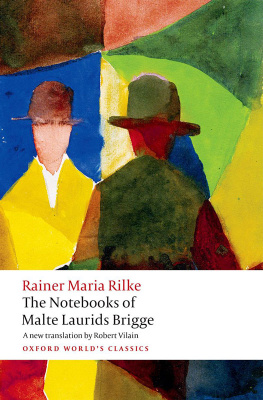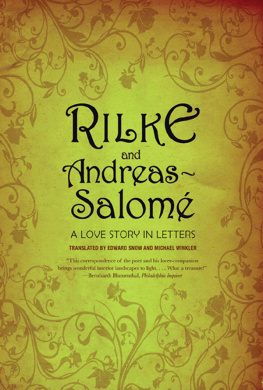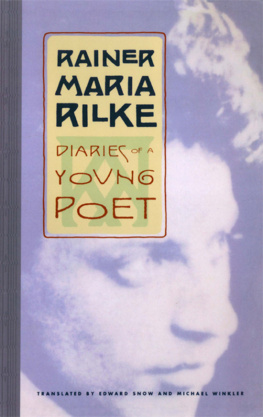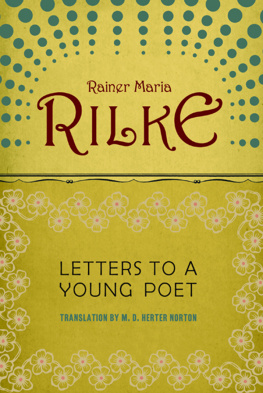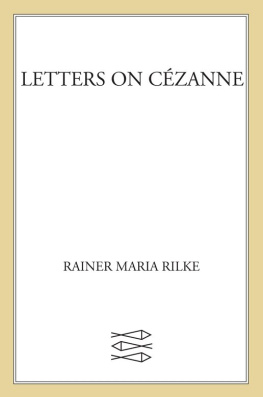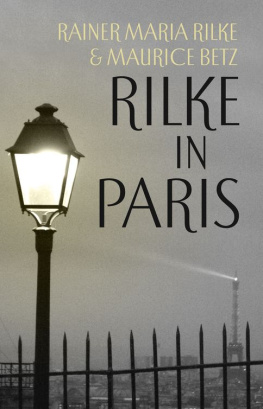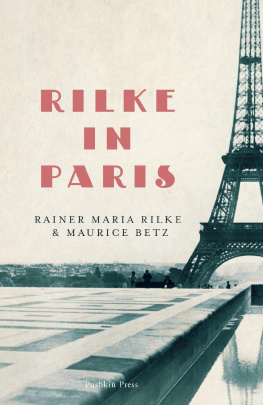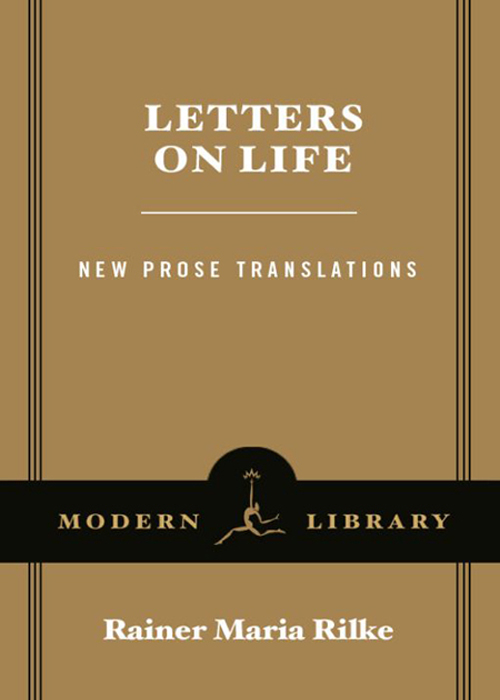
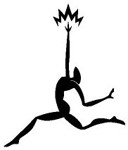
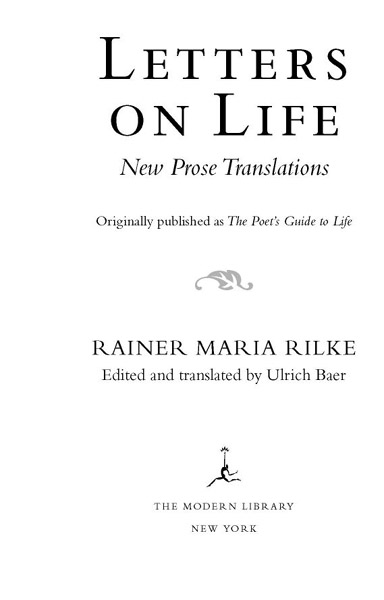
Table of Contents
Praise for LETTERS ON LIFE Originally published as The Poets Guide to Life
Most Western wisdom writers exalt renunciation rather than desire. Rilke is almost Asian in his differences from Goethe, Nietzsche, Freud. For him, eros is not the wisdom of fools and the folly of the wise. Nor does he, like Platos Socrates, climb the ladder of love toward the Good. Ulrich Baer uniquely makes available Rilkes bittersweet apprehensions of the objective realities-of-desire, and of the consequent, triumphantly knowing poetics-of-loss.
HAROLD BLOOM,
author of Where Shall Wisdom Be Found? and The Western Canon
Rilke longed to be a worker, and in one autobiographical poem he described his face as that of someone who serves. Like Dante he believed that love is the animating force in the universethough Rilkes quest took him, not toward the stars, but back to the earth, to the unnoticed miracle of things precisely as they are. Professor Baers book is the best of its kind I have ever encountered. It is clearly and elegantly translated and arranged, an inspired gift to a world in terrible need of Rilkes grave and joyful vision.
FRANZ WRIGHT,
author of Walking to Marthas Vineyard, winner of the Pulitzer Prize for poetry
This thematic selection from the vast trove of Rilkes letters and papers reveals an unfamiliar side of the poet that broadens and deepens the range of his thought. Professor Baers translations are eloquent, and his splendid Introduction is sensitive, thorough, and illuminating.
BURTON PIKE,
professor emeritus of comparative literature at City University of New York, and award-winning translator
Boy, Rilke is a kook. Reading Letters on Life, I have to say that I love his point of view.
GUS VAN SANT,
director of Good Will Hunting, My Own Private Idaho, and many other films
[An] illuminating new collection.
LibraryJournal
For anyone who admires Rilke and the timeless profundity of his messages, and for those who seek an introduction of his worldview, this is an indispensable resource.
Booklist

Do not believe that the person who is trying to offer you solace lives his life effortlessly among the simple and quiet words that might occasionally comfort you. His life is filled with much hardship and sadness, and it remains far behind yours. But if it were otherwise, he could never have found these words.
[T]here are so many people who expect of me, I dont know exactly whathelp, advice (of me who finds himself so baffled and helpless before lifes most tremendous urgencies!)and although I know that they are mistaken, that they are wrong in this regard, I am tempted nonetheless (and I dont believe that this is an act of vanity!) to share with them a few of my experiencessome of the fruits of my long solitudes... And women and young girls, terribly abandoned even at the bosom of their familiesand newly-weds, horrified by what just happened to them... , and then all of these young people, for the most part revolutionary workers who leave the state prisons completely directionless and who stumble into literature by writing poems like mean drunks... : what to tell them? How to lift up their desperate heart, how to shape their disfigured will, which has assumed the character of something borrowed and altogether provisional under the impact of events and which they now carry inside themselves like an alien power that they hardly know how to use!
INTRODUCTION

Ulrich Baer
But to have been
once, even though only once:
this having been earthly seems lasting, beyond repeal.
All that we
can achieve here, is to recognize ourselves completely
in what can be seen on earth.
DUINO ELEGIES (NR 9)
Every morning the poet sat down at his desk to work. Everything had been carefully prepared: he had dressed in shirt, tie, and a dark tailored suit; eaten breakfast at the table (whenever possible, there was real silver and heavy linen); sipped his good coffee; and kept most of his language to himself, expending it only to address his discreet housekeeper with a brief comment about the weather or how the cut flowers were nicely holding up. Now he faced the two pens before him. One pen was reserved for work the few volumes of poems that he had published and the single novel that had won him some acclaimwhile the other was the pen for dispensing with bills, requests, and letters, the sort of things that required words and language but did not qualify, as far as the reading public or his own exacting self were concerned, as poetic work. He had adopted a maxim early in life, during one of his apprenticeships with an older artist whose exemplary focus had been an inspiration: One must work, nothing but work, and one must have patience. On several occasions, he had cited this maxim in print and had even authored a short book on the artists work and life. But, in truth, it had not been easy for him to understand how a person could so uncompromisingly privilege work above all else. Alas, how to live according to this mantra, which extolled the sanctification of work, proved even harder. Nothing but work. Every morning, face nothing but yourself, be truly alone, and choose between the two pens that could channel the production of the day. There was the desk, carefully placed in the center of the room and lovingly covered with a silk scarf lent by a wealthy friend; there were the flowers sent by the same friend and arranged in a round white vase; there was one stack of expensive work paper and another one of equally expensive (really quite indulgent) stationery. Everything was set, he was dressed the part, and now it was only a matter of setting pen to paper and then nothing but work. But Rilke knew that his maxim was starting to sound as hollow as most daily prayers, and he knew even more acutely that all his trappings were nothing but a disguise, a masquerade to cover up the self-indulgent urge to get up and walk somewhere, go back to bed, to check on the mail or on the roses, to give in to temptation and take a walk, take a call, take a break. Just as he was about to rise from his chair, ready to lose this mornings battle that lasted but seconds and yet tore at his soul, his eyes fell on the small book listing his correspondence. Every letter he received was entered there with name and date, and those to whom he had responded were crossed off.
He would write letter after letter, several of them running up to eight pages in length. The next thing that happened was the housekeepers gentle tapping on the door. It was lunchtime. A stack of neatly addressed envelopes had risen on the table, and more than two dozen names had been crossed off the certain little list in the small book. Had he worked? Which pen had been picked up? For several hours, language had coursed through him as if it were oil or wax that becomes more pliant when subjected to movement and heat. His pen had yielded what he called the juice: a few of the letters were personal, playful, brimming with witty images, self-mocking asides and details of his everyday life; others barely contained a proper greeting before unfolding an extended and precise reflection on a particular question or problem. Throughout the morning, Rilke had conversed intimately with a series of individuals, ever so slightly inflecting his voice for each of them. In the process of writing his letters, he had advanced not only his thinking but also his language. Since these were letters destined to leave him within hours, however, they served a different function from the journal, diary, and notebooks he kept to jot down drafts and ideas as potential seeds for longer poems. The letters became the rehearsal space of which Rilke lifted the curtain on his creative process just enough to fend off the sense of isolation that threatened to undermine his hard-won and cherished solitude. In addition to my voice which points beyond me, he writes in a letter of January 24, 1920, there is still the sound of that small longing which originates in my solitude and which I have not entirely mastered, a whistling-woeful tone that blows through a crack in this leaky solitude, it
Next page

